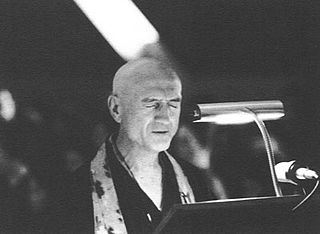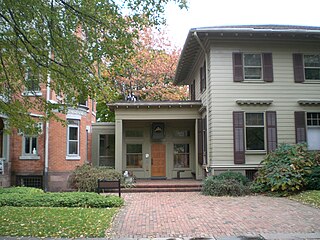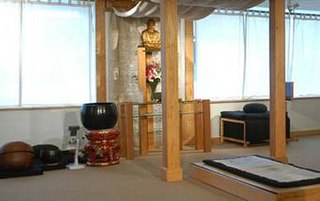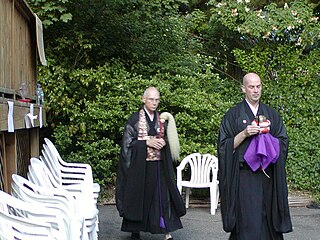Related Research Articles

Philip Kapleau was an American teacher of Zen Buddhism in the Sanbo Kyodan tradition, which is rooted in Japanese Sōtō and incorporates Rinzai-school koan-study. He also strongly advocated for Buddhist vegetarianism.

The term American Buddhism can be used to describe all Buddhist groups within the United States, including Asian-American Buddhists born into the faith, who comprise the largest percentage of Buddhists in the country.

Sanbo Kyodan is a lay Zen sect derived from both the Soto (Caodong) and the Rinzai (Linji) traditions. It was renamed Sanbo-Zen International in 2014. The term Sanbo Kyodan has often been used to refer to the Harada-Yasutani zen lineage. However, a number of Yasutani's students have started their own teaching lines that are independent from Sanbo Kyodan. Strictly speaking, Sanbo Kyodan refers only to the organization that is now known as Sanbo-Zen International.

Japanese Zen refers to the Japanese forms of Zen Buddhism, an originally Chinese Mahāyāna school of Buddhism that strongly emphasizes dhyāna, the meditative training of awareness and equanimity. This practice, according to Zen proponents, gives insight into one's true nature, or the emptiness of inherent existence, which opens the way to a liberated way of living.

Bernie Glassman was an American Zen Buddhist roshi and founder of the Zen Peacemakers, an organization established in 1980. In 1996, he co-founded the Zen Peacemaker Order with his late wife Sandra Jishu Holmes. Glassman was a Dharma successor of the late Taizan Maezumi-roshi, and gave inka and Dharma transmission to several people.

Toni Packer was a teacher of "meditative inquiry", and the founder of Springwater Center. Packer was a former student in the Sanbo Kyodan lineage of Zen Buddhism, and was previously in line to be the successor of Phillip Kapleau at the Rochester Zen Center.

The Rochester Zen Center (RZC) is a Sōtō and Rinzai Zen Buddhist sangha in the Kapleau lineage, located in Rochester, New York and established in 1966 by Philip Kapleau. It is one of the oldest Zen centers in the United States.

Hakuun Yasutani was a Sōtō priest and the founder of the Sanbo Kyodan, a lay Japanese Zen group. Through his students Philip Kapleau and Taizan Maezumi, Yasutani has been one of the principal forces in founding western (lay) Zen-practice.
A prostration is a gesture used in Buddhist practice to show reverence to the Triple Gem and other objects of veneration.

Kyudo Nakagawa, or Nakagawa Kyūdō, was a Japanese-born Rinzai rōshi who for many years led Soho Zen Buddhist Society, Inc. in Manhattan's Lower East Side.

Dr. Soyu Matsuoka, along with Sokei-an and Nyogen Senzaki, was one of the early Zen teachers to make the United States his home.

Bodhin Kjolhede is a Sōtō/Rinzai Zen roshi and Abbot of the Rochester Zen Center (RZC), a position he assumed when Philip Kapleau retired from teaching in 1986. He was ordained as a priest in 1976 and received Dharma transmission in 1986. He has authorized eight of his disciples as teachers in their own right: Sante Poromaa, Kanja Odland, Sevan Ross, Gerardo Gally, Amala Wrightson, Robert Goldmann, John Pulleyn, and Donna Kowal. Additionally, Kjolhede has been offered transmission in a Sōtō lineage, but has thus far chosen to decline.
Below is a timeline of important events regarding Zen Buddhism in the United States. Dates with "?" are approximate.
Gyokuko Carlson is a Soto Zen roshi and abbess of Dharma Rain Zen Center in Portland, Oregon, United States.

The Atlanta Soto Zen Center (ASZC) is a Soto Zen practice center founded in 1977 by Zenkai Taiun Michael Elliston-sensei, a dharma heir of the late Soyu Matsuoka and guiding teacher of the Mokurai Silent Thunder Order. Rev. Elliston has also received transmission in the Uchiyama lineage through Shohaku Okumura, roshi. The Atlanta Soto Zen Center is recognized by the Soto Zen Buddhist Association and serves as the main training center for the order which has affiliate centers throughout the United States and Canada.
The Pacific Zen Institute (PZI), is a Zen Buddhist practice center in Santa Rosa, California. Established in 1999, its stated mission is to "create a culture of transformation through meditation, koans, conversation, and the arts." Its founding director is John Tarrant, who developed ways of teaching koans that can orient anyone, including people with little or no experience in meditation or Zen, toward awakening and a rich, full engagement with their own lives. PZI has a number of affiliate centers in the lineage of John Tarrant, a dharma heir of Robert Baker Aitken, and formerly of the Sanbo Kyodan school of Zen.
Michael Danan Henry is an American Roshi in the Harada-Yasutani lineage, a Zen sect derived from both the Rinzai and Sōtō traditions of Japanese Zen, practicing in the Diamond Sangha lineage of Robert Baker Aitken. The founding teacher of the Zen Center of Denver, Henry received Dharma transmission from Philip Kapleau Roshi in 1989 and was subsequently recognized as a Diamond Sangha teacher and master by Robert Baker Aitken. Danan Henry Roshi created and implemented the Monastery Without Walls training program; the Lotus in the Flame Lay Order; and the "Every Minute Zen" mindfulness practice as abbot and spiritual director of the Zen Center of Denver.

Jisha (侍者), along with the titles inji and sannō, are Japanese terms used in reference to the personal attendant of a monastery's abbot or teacher in Zen Buddhism. In the Rinzai school, the term is usually either inji or sannō. According to the book 3 Bowls: Vegetarian Recipes from an American Zen Buddhist Monastery, "While the jikijitsu is the stern father of the zendo, the jisha is the den mother, balancing the strictness that his counterpoint establishes. The jisha prepares for and greets all guests, tends to the needs of the students, takes care of the sick, and organizes the cleaning of the monastery." According to author Victor Sōgen Hori, "In the Northern Sung period, a master of a large monastery had two attendants, but by the Yüan period the number of attendants had increased to five: an incense attendant, a secretary attendant, a guest attendant, a robe attendant, and a 'hot water and medicine' attendant who cooked for him."

Sante Poromaa Roshi is a Zen Buddhist priest and teacher, in the lineage of Harada-Yasutani. He was born in 1958 in Kiruna, Sweden, and commenced his Zen training in the early eighties, as a student of Roshi Philip Kapleau. When Roshi Kapleau went into semi-retirement, he also became a student of Kapleau's successor, Roshi Bodhin Kjolhede.
Zen was introduced in the United States at the end of the 19th century by Japanese teachers who went to America to serve groups of Japanese immigrants and become acquainted with the American culture. After World War II, interest from non-Asian Americans grew rapidly. This resulted in the commencement of an indigenous American Zen tradition which also influences the larger western (Zen) world.
References
- Friedman, Lenore (2000). Meetings With Remarkable Women: Buddhist Teachers in America. Shambhala. ISBN 1-57062-474-7.
- Snelling, John (1998). Opening the Lotus: A Woman's Guide to Buddhism. Beacon Press. pp. 156. ISBN 978-0-8070-7309-4.
- Wilson, Jeff (1999). The Buddhist Handbook: A Complete Guide to Buddhist Schools, Teaching. Inner Traditions. ISBN 978-0-89281-761-0.
- Ford, James Ishmael (2006). Zen Master Who?: A Guide to the People and Stories of Zen. Wisdom Publications. ISBN 0-86171-509-8.